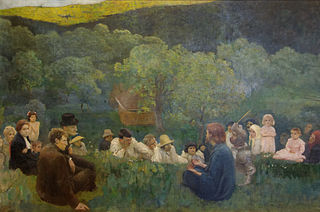Related Research Articles
In many religious, philosophical, and mythological traditions, the soul is the incorporeal essence of a living being. Soul or psyche comprises the mental abilities of a living being: reason, character, feeling, consciousness, qualia, memory, perception, thinking, etc. Depending on the philosophical system, a soul can either be mortal or immortal.

Matthew 3:10 is the tenth verse of the third chapter of the Gospel of Matthew in the New Testament. The verse occurs in where John the Baptist is berating the Pharisees and Sadducees. He has previously called them a brood of vipers and warned them of the wrath to come and has urged them to repent. This verse returns to the fruit metaphor of Matthew 3:8 adding a promise of eventual punishment.

Matthew 5:25 is the twenty-fifth verse of the fifth chapter of the Gospel of Matthew in the New Testament and is part of the Sermon on the Mount. In this first of the 6 Antitheses Jesus has been attacking anger and advocating reconciliation. In this verse he states that it is prudential to quickly reach agreement with one's adversary.

Matthew 5:29 is the twenty-ninth verse of the fifth chapter of the Gospel of Matthew in the New Testament and is part of the Sermon on the Mount. It is the third verse of the discussion of adultery.

Matthew 5:39 is the thirty-ninth verse of the fifth chapter of the Gospel of Matthew in the New Testament and is part of the Sermon on the Mount. This is the second verse of the antithesis on the command: "eye for an eye". In one of the most famous verses in the New Testament, Jesus here rejects revenge and retaliation, instead telling his followers to turn the other cheek.

Matthew 6:1 is the first verse of the sixth chapter of the Gospel of Matthew in the New Testament and is part of the Sermon on the Mount. This verse begins the discussion of how even good deeds can be done for the wrong reasons.

Matthew 6:19 and 6:20 are the nineteenth and twentieth verses of the sixth chapter of the Gospel of Matthew in the New Testament and are part of the Sermon on the Mount. These verses open the discussion of wealth. These verses are paralleled in Luke 12:33.

Matthew 6:22 is the twenty-second verse of the sixth chapter of the Gospel of Matthew in the New Testament, and is part of the Sermon on the Mount.

Matthew 6:25 is the twenty-fifth verse of the sixth chapter of the Gospel of Matthew in the New Testament and is part of the Sermon on the Mount. This verse shifts the discussion from one of money to one of worry.

Matthew 9:6 is the sixth verse in the ninth chapter of the Gospel of Matthew in the New Testament.

Matthew 8:12 is the twelfth verse of the eighth chapter of the Gospel of Matthew in the New Testament. This verse is part of the conclusion to the miracle story of healing the centurion's servant, the second of a series of miracles in Matthew. This verse warns that many Jews are lacking in faith after praising the Gentile Centurion in the previous verse for his.
Matthew 10:5 is a verse in the ninth chapter of the Gospel of Matthew in the New Testament.
Matthew 9:17 is a verse in the ninth chapter of the Gospel of Matthew in the New Testament.
Matthew 9:22 is a verse in the ninth chapter of the Gospel of Matthew in the New Testament.

Matthew 8:29 is the 29th verse in the eighth chapter of the Gospel of Matthew in the New Testament.
Matthew 10:19 is a verse in the ninth chapter of the Gospel of Matthew in the New Testament.
Matthew 10:26 is a verse in the ninth chapter of the Gospel of Matthew in the New Testament.
In Christian theology, Hell is the place or state into which, by God's definitive judgment, unrepentant sinners pass in the general judgment, or, as some Christians believe, immediately after death. Its character is inferred from teaching in the biblical texts, some of which, interpreted literally, have given rise to the popular idea of Hell. Theologians today generally see Hell as the logical consequence of using free will to reject union with God and, because God will not force conformity, it is not incompatible with God's justice and mercy.
Papyrus 19, signed by 19, is an early copy of the New Testament in Greek. The manuscript paleographically has been assigned to the 4th or 5th century.
In Christianity, annihilationism is the belief that those who are wicked will perish or cease to exist. It states that after the final judgment, all unsaved human beings, all fallen angels and Satan himself will be totally destroyed so as to not exist, or that their consciousness will be extinguished rather than suffer everlasting torment in hell.
References
- ↑ Robert Witham, Annotations on the New Testament of Jesus Christ. Dublin: 1730.
- 1 2 3 4 5 "Catena aurea: commentary on the four Gospels, collected out of the works of the Fathers: Volume 6, St. John. Oxford: Parker, 1874. Thomas Aquinas".
 This article incorporates text from this source, which is in the public domain.
This article incorporates text from this source, which is in the public domain.